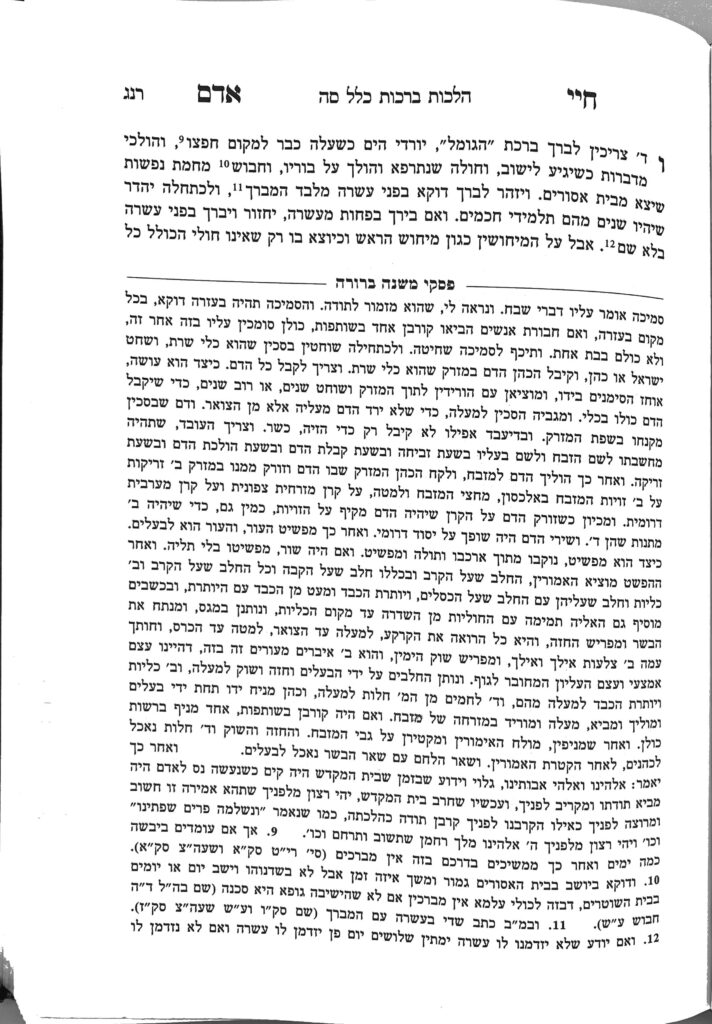We are continuing in siman 6, which discusses birchas hagomeil. We learned that a sick person who recovers must be omeid al burio, at full strength, to recite hagomeil. If a person is fully recovered and is maintaining treatments or therapy to prevent any relapse, they are considered omeid al burio and should recite hagomeil. If a person still requires procedures in order to recover to full strength, they should wait to recite hagomeil.
We left off discussing the number of people in front of whom one should recite the bracha. The Chayei Adam wrote that one should recite the bracha in front of 10 people, but the Mishnah Berurah paskens that one can recite the bracha in front of nine other people, so that there are 10 including the one reciting the bracha.
The Chayei Adam writes that lechatchilla, two of the people present when reciting hagomeil should be talmidei chachamim. The kapitel in tehillim which describes the four types of people who are obligated to give thanks to Hashem describes that one should give this thanks in front of zekeinim. We know that the usage of the word zekeinim refers to zeh she’kanah chochmah (one who has acquired wisdom); i.e., a talmid chacham. Since the pasuk refers to a plurality of zekeinim, we learn that there should be at least two.
The pasuk further refers to praising Hashem bikhal am, and we know from other sources that a khal refers to a group of at least 10. Therefore, the Chayei Adam writes that if one is unable to recite the bracha in front of 10 people, when they are able to find 10 people, they should recite the bracha again without Hashem’s name, due to a safeik whether they were yotzei reciting it the first time. The Mishnah Berurah adds that if one will be able to find 10 people within 30 days of when they first became obligated to recite hagomeil, they should refrain from reciting it until then. If it will be more than 30 days, they should follow the procedure of the Chayei Adam.
The Chayei Adam writes that if one is not feeling well but is not in any specific danger, they do not recite hagomeil after recuperating. Rather, the definition of illness for the purpose of this bracha is being bedridden for three days. The Mishnah Berurah points out that the Chayei Adam’s three day rule refers to a non-life-threatening event. If the illness was a life–threatening event, even if it lasted for less than three days, one would recite hagomeil.
We have learned (shiur 1255) that there is a machlokes whether one recites hagomeil only over the four scenarios discussed in kapitel 107, or in any similar life-threatening situation. The second machlokes regarding this bracha is whether the bracha is recited on any level of experience of these four scenarios, or only when they are life-threatening. In siman 219:7 and 8, the Shulchan Aruch writes that any illness which causes one to become bedridden, even if it is not life-threatening, requires recitation of hagomeil. The Shulchan Aruch explains that a person becoming bedridden is akin to being brought up to judgement, where the verdict can end up in either direction. Thus, even if a person recovers, the fact that they were in a state of judgement, which had potential to lead to a sentence of death, requires recitation of hagomeil. The Rema disagrees, and writes that one only recites hagomeil when the illness was clearly life-threatening.
Similarly, in siman 219:7, the Shulchan Aruch and Rema have a parellel machlokes regarding one who travels through the desert. The Shulchan Aruch writes that in France, the minhag was not to recite hagomeil for traveling from city to city.. However, in Spain, the minhag is to recite hagomeil, because all roads have an element of danger. The Shulchan Aruch follows the opinion of the chachmei Sefard (Spain) because it is travel, (albeit not exactly the same, but close enough to be included in the four) which is akin to the scenario brought in Chazal. The Rema understands the cases to be examples of significant danger and whereas there is no danger per se, one would nat say the bracha. It turns out the Shulchan Aruch’s chumra of limiting it to the four cases becomes a kula here, to say it even without an obvious danger, and the Rema’s kula to apply hagomeil to other cases becomes chumra here not to say hagomeil, like the chachmei Tzarfas (France)
Summary
- Lechatchilla, hagomeil should be recited in front of 10 people (11 including the one reciting the bracha), and at least two of those assembled should be talmidei chachamim. The Mishnah Berurah paskens that one can recite the bracha in front of nine other people, so that there are 10 including the one reciting the bracha.
- If one will not be able to gather 10 people within 30 days of the incident requiring hagomeil, they should recite it with a bracha in front of less than 10, and, when they are able to gather 10, they should repeat the bracha without Hashem’s name.
- Regarding reciting the bracha after recovering from an illness, if one was ill with a life-threatening illness for any amount of time, they recite hagomeil. If the illness was not life-threatening, they recite hagomeil if they were bedridden for three days. (We will see that the Mishnah Berurah disagrees with this)
- The minhag Sephardim is to recite hagomeil only in the four cases mentioned in Chazal, and the minhag Ashkenazim is to recite it after any life-threatening situation.
- Furthermore, the minhag Sephardim is to recite the bracha on any level of experience of these four scenarios. The minhag Ashkenazim is to recite the bracha only when the experience was life-threatening (but to recite it on any life-threatening scenario, even if not one of the four, as mentioned above).



